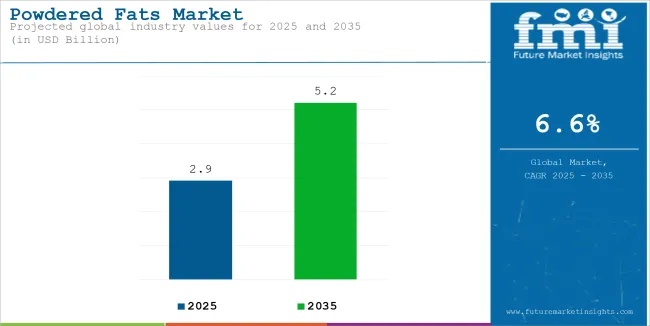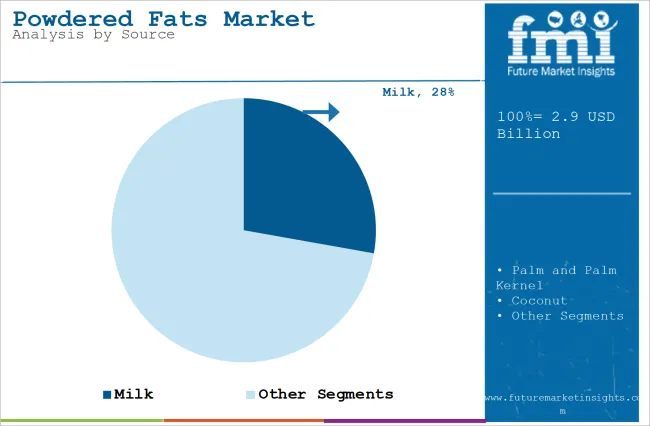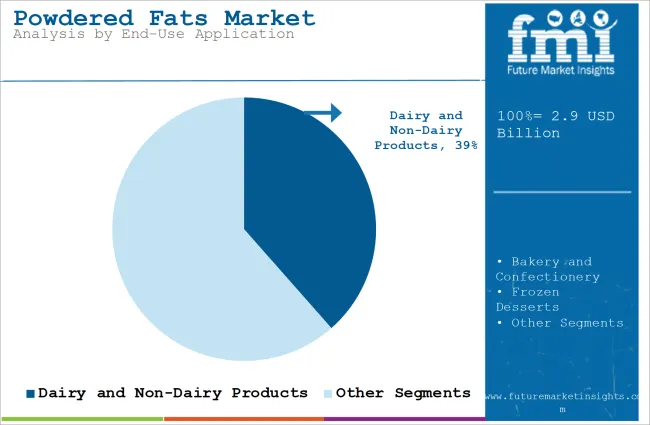The global powdered fats market size is estimated to account for USD 2.9 billion in 2025. It is anticipated to grow at a CAGR of 6.6% during the assessment period and reach a value of USD 5.2 billion by 2035.

| Attributes | Description |
|---|---|
| Estimated Global Powdered Fats Market Size (2025E) | USD 2.9 billion |
| Projected Global Powdered Fats Market Value (2035F) | USD 5.2 billion |
| Value-based CAGR (2025 to 2035) | 6.6% |
Fat processed into a dry, powder-like consistency is known as powdered fat. It is a component of many different culinary applications and food items. The market is growing due to a surge in preference for convenience and ready-to-eat foods.
Busy lifestyles are making consumers look for quicker and easier solutions for meals, and this is resulting in higher demand for processed snacks, baked goods, and instant meals. The advantage of powdered fats is that they are easy to handle, store, and include in food products. They allow uniform texture and flavor in numerous food applications.
The price of powdered fats depends on the source of the fat, the level of processing, and whether the product is organic or specialty blended. Plant-based powdered fats, such as those derived from coconut or sunflower, are generally more affordable, with a price range of USD 5 to USD 10 per kg.
Animal-based powdered fats are more expensive, typically ranging from USD 6 to USD 12 per kg, as they require specific processing for quality and stability. Specialty blends are often customized at higher prices, ranging from USD 8 to USD 15 per kg, due to the tailored formulations and the added complexity in production.
| Type of Powdered Fats | Price Range (per kg) |
|---|---|
| Plant-Based Powders | USD 5 - USD 10 |
| Animal-Based Powders | USD 6 - USD 12 |
| Specialty Blends | USD 8 - USD 15 |
| Organic Powders | USD 10 - USD 20 |
Organic powdered fats are at the higher end of the price range, and they may cost from USD 10 to USD 20 per kg. This is due to the source of organic raw materials, which require certification and strictly followed agricultural practices. Moreover, the organic certification process contributes to the cost of producing it.
It might be expensive, but the demand for organic powdered fats is growing significantly due to the demand for clean labels and sustainable resources. Price distinctions between these two categories also occur when consumers require varied quality, sustainability, and functionalities in their consumables.
The export and import data for the market shows steady growth in both export and import activities. Exports have been steadily increasing, rising from USD 250 million in 2020 to an estimated USD 350 million in 2024. This growth reflects the rising global demand for powdered fats, specifically in regions that are emphasizing plant-based and clean-label products.
Countries with strong food manufacturing industries and demand for processed and convenience foods are key importers of powdered fats, accounting for the rise in import figures, which increased from USD 300 million in 2020 to USD 380 million in 2024.
| Exports (in USD Million) (India | Imports (in USD Million) (India) |
|---|---|
| 250 (2020) | 300 (2020) |
| 270 (2021) | 320 (2021) |
| 300 (2022) | 340 (2022) |
| 330 (2023) | 360 (2023) |
| 350 (2024) | 380 (2024) |
The continuous growth in both exports and imports suggests that powdered fats continue to gain an increasing level of incorporation into global food production and consumption. Import data suggests an even higher demand among developed markets that necessitates a consistent supply of high-quality, specialty powdered fats. This expansion can be traced to the growth of plant-based diets and the clean-label food trend, thereby expanding the market base for powdered fats.
It is further indicated that an increase in exports may be caused by the capacity of suppliers to scale production to meet such global needs, reinforcing the rising importance of the fats market on the international stage.
Innovation in Food Processing Technologies to Augment Demand
Advancements in food processing technologies have reduced the production time and costs involved in making powdered fats. Today, modern spray and vacuum dryers make high-quality production of powdered fats possible while preserving their nutrition, flavor, and stability.
With advancements, manufacturers will continue to provide an adequate quantity of powdered fats for different types of food applications, including bakery, dairy products, confectionery products, and snacks.
Rising Use in Health-Conscious Formulations to Propel Sales
As consumers are becoming more health-conscious, the demand for fat options in formulations that provide lower levels of trans fats or saturated fats is increasing. Powdered fats are often used in health-conscious food products because they can be formulated to include healthier fat sources, including unsaturated fats or plant-based oils. These healthier options appeal to consumers looking to reduce their intake of unhealthy fats while still enjoying the taste and texture that fats provide in foods.
High Cost of Production May Hamper Uptake
Spray drying can be expensive due to the complex processing technologies. These processes need considerable energy and operational costs, which can make powdered fats costlier than their liquid counterparts. Additionally, the cost increases further due to maintenance of the quality and stability of powdered fats during production and storage. Owing to this higher production cost, price-sensitive markets may restrict more uptake, since manufacturers can use cheaper alternatives or opt for a lower-priced product.
Increased Demand for Plant-Based Fats
Rising interests in plant-based diets and vegan alternatives have sparked a demand for powdered fats based on plant-derived sources, which include coconut, sunflower, and palm oils. Consumers today are more aware of their food choices, preferring the products to be plant-based with no animal content.
This has led manufacturers to innovate and produce plant-based powdered fats that would meet the dietary preferences of health-conscious consumers and others who are interested in dairy-free or vegetarian diets.
Emphasis on Clean-Label and Natural Ingredients
Consumers are increasingly looking for clean-label products with natural, simple ingredients, which is having a major influence on the market. Increasing demand for food labeling transparency is bolstering the demand for products that do not contain artificial additives, preservatives, and synthetic ingredients.
Because of these demands, manufacturers of food products have emphasized their production of powdered fats by using only natural and minimally processed ingredients, which meets the demand of consumers who look for clean, wholesome food. In line with this trend, powdered fats are being produced with organic certification and fair source practices.
Growing Move Toward Healthier and More Sustainable Food Options
Consumers have become increasingly conscious of the relationship between their food choices, their health, and the environment. This trend is driving demand for powdered fats derived from healthier sources, including plant-based oils and those with decreased levels of saturated fats or trans content.
Moreover, consumer demand for products with clean labels, natural ingredients, and minimal processing is rising; this also happens to fit in with wider desires for transparency, sustainability, and nutritious options. Consumers are now prioritizing sustainable sourcing practices of products. This also helps contribute to the increase in demand for healthier, ethically produced powdered fats.

| Attributes | Details |
|---|---|
| Top Source | Milk |
| Market Share in 2025 | 27.8% |
Based on source, the market is divided into milk, palm and palm kernel, coconut, sunflower, canola, corn, and others. The milk segment is expected to account for 27.8% market share in 2025. Milk-sourced powdered fats possess unique functional characteristics and these fats can be used in a variety of food products.
They improve the texture, flavor, and mouthfeel, which are some of the key attributes of dairy-based products, baked goods, and confectionery. The creamy, rich consistency of milk-sourced fats also enhances the sensory experience of the food.

| Attributes | Details |
|---|---|
| Top End-Use Application | Dairy and Non-Dairy Products |
| Market Share in 2025 | 38.5% |
Based on end-use application, the market is divided into dairy and non-dairy products, bakery and confectionery, frozen desserts, baby food and infant formula, supplements and nutritional products, and others. The dairy and non-dairy products segment is expected to account for 38.5% market share in 2025. The advantage of powdered fats is that they can be formulated in both dairy and non-dairy applications with much more versatility.
In the case of dairy, they allow for rich textures and flavors with minimal addition of moisture, such as in the case of powdered milk, cheese, and ice cream. Non-dairy application allows manufacturers to create plant-based and vegan products such as plant-based milk and desserts, which provide similar textures and mouthfeel compared to traditional dairy products. Moreover, powdered fats can be tailored for certain applications, such as low-fat, functional, or clean-label products.
Based on processing, the market is divided into spray drying, drum drying, freeze drying, and others. Spray drying is the most widely used method for producing powdered fats as it very effectively converts liquid fats into a fine powder.
It involves spraying a liquid fat into the hot air chamber wherein fast evaporation of moisture leaves behind fine fat particles. Moreover, it allows for better control over the fat content, which is essential for maintaining the desired properties of the final product, including creaminess and mouthfeel. Additionally, it is highly suited for large-scale production and can handle a very wide variety of fat types, including both dairy and plant-based fats.
India is expected to grow at a CAGR of 9.9% from 2025 to 2035. The country’s food and beverage sector is witnessing quick expansion. This can be credited to the growing availability of a diverse array of food products and shifting consumer preferences.
Moreover, with growing dairy and non-dairy segments, the product is witnessing a surging demand in the production of various food products including bakery products, confectionery, and more. The versatility of powdered fats makes them a go-to ingredient in both traditional Indian foods and Western-style processed items, driving their adoption in various sectors.
The surging per capita income and move toward Western dietary patterns are leading to market expansion in the country. The country is also witnessing a growth in usage of ingredients such as powdered fats in the food industry due to rising preference for packaged and processed food items. The expansion of the fast food market and changing food trends are further propelling market growth.
The USA is anticipated to grow at a CAGR of 6.8% from 2025 to 2035. The growing popularity of plant-based diets and dairy alternatives in the USA is fostering market growth. Plant-based products such as almond milk, soy milk, and vegan cheeses typically require powdered fats to mimic the creamy textures and mouthfeel characteristic of dairy products. Powdered fats from plant sources, including coconut, palm, and sunflower, are increasingly being used in the manufacturing of plant-based foods and beverages.
The surging demand for convenience food is boosting market growth in the country. The rising health-consciousness in the country and adoption of vegan diets are also boosting the demand for the product. Moreover, plant-based powdered fats are witnessing growing usage in dairy substitutes and vegan food formulations. The surging awareness of healthier lifestyles is further contributing to the growth of the market.
As in many other countries, UK consumers are increasingly looking for convenience foods that fit into their busy lifestyles. Ready-to-eat meals, snacks, and bakery products are becoming more popular, and powdered fats are crucial ingredients in these items due to their ease of use, stability, and ability to improve texture and shelf life.
The convenience factor makes powdered fats the perfect candidate for rapid preparation, ensuring the final product retains consistent quality, which is a prerequisite for food manufacturers targeting the busy consumer. This explains why demand for such products is high.
The rising trend toward specialized and premium food items in the country, specifically in the organic food segment, is driving market growth. The product is witnessing heightened demand in the preparation of food items with particular health benefits, including sugar-free, high-protein, and low-fat products.
The powdered fats market is highly competitive, with Bunge Loders Croklaan, Cargill, and ADM leading the pack in terms of product advancement and sustainability efforts. These companies are developing specialized powdered fats that meet a wide range of food applications, including bakery, snacks, and confectionery. Sustainable sourcing practices have been prioritized by Bunge, focusing specifically on the use of more responsible palm oil.
Moreover, ADM is another major player that is diversifying its powdered fat portfolio, with a special focus on clean-label ingredients appealing to health-conscious consumers.
Many startups have emerged in the market, mainly driven by innovation, sustainability, and niche consumer needs. For example, The Good Fat Co. is developing healthy and sustainable powdered fat products based on natural sources including coconut and avocado.
Their key growth strategy focuses on meeting the growing demand for clean-label, plant-based fats that consumers desire, given the demand for healthier and more sustainable food choices. Good Fat Co. is creating robust relationships with retailers and food manufacturers to take their products to mass markets.
Moreover, another notable startup is CocoCafe which specializes in powdered coconut fats and has positioned itself as a supplier of clean and organic ingredients. These startups leverage the clean-label and plant-based ingredients trend to market themselves amidst the competition based on the innovative and sustainable products that they are developing.
In terms of source, the market is segmented into milk, palm and palm kernel, coconut, sunflower, canola, corn, and others.
In terms of end-use application, the market is segmented into dairy and non-dairy products, bakery and confectionery, frozen desserts, baby food and infant formula, supplements and nutritional products, and others.
In terms of processing, the market is segmented into spray drying, drum drying, freeze drying, and others.
In terms of region, the market is segmented into North America, Europe, Asia Pacific, Latin America, and the Middle East & Africa.
The market is predicted to reach a size of USD 5.2 billion by 2035.
The market size is poised to reach USD 2.9 billion in 2025.
The prominent companies in the powdered fats market include Castle Dairy SA, Zeon Lifesciences Ltd., and Kerry Group plc.
India is a key hub for product manufacturers.






Full Research Suite comprises of:
Market outlook & trends analysis
Interviews & case studies
Strategic recommendations
Vendor profiles & capabilities analysis
5-year forecasts
8 regions and 60+ country-level data splits
Market segment data splits
12 months of continuous data updates
DELIVERED AS:
PDF EXCEL ONLINE
Powdered Cellulose Market Analysis - Size, Share, and Forecast Outlook 2025 to 2035
Powdered Soft Drinks Market Size and Share Forecast Outlook 2025 to 2035
Powdered Beverage Market Outlook – Growth, Demand & Forecast 2024-2034
Powdered Hand Soap Market
Korea Powdered Cellulose Market Analysis by Source, End-use, Functionality, and Region Through 2035
Japan Powdered Cellulose Market, By Type, By Application, By Region, and Forecast, 2025 to 2035
Chocolate Powdered Drinks Market
Demand for Powdered Cellulose in EU Size and Share Forecast Outlook 2025 to 2035
Western Europe Powdered Cellulose Market Analysis by Source, End-use, Functionality, and Country Through 2035
Fats And Oils Market Size and Share Forecast Outlook 2025 to 2035
Algae Fats Market Trends - Sustainable Fat Innovations 2025 to 2035
Yellow Fats Market Size and Share Forecast Outlook 2025 to 2035
Filling Fats Market Size, Growth, and Forecast for 2025 to 2035
Healthy Fats Low Carb Market Trends - Demand & Consumer Shifts 2025 to 2035
Spreadable Fats Market Analysis by Product, Source, End Use and Distribution channel Through 2035
Confectionery Fats Market
Edible Oils and Fats Market Analysis by Product Type, Source, and Distribution Channel Through 2035
Interesterified Fats Market Growth - Food Processing & Health Trends 2025 to 2035
Normal and Specialty Fats Market Analysis by Type, Application, End Use and Region through 2035
United Kingdom Interesterified Fats Market Size and Share Forecast Outlook 2025 to 2035

Thank you!
You will receive an email from our Business Development Manager. Please be sure to check your SPAM/JUNK folder too.
Chat With
MaRIA